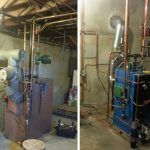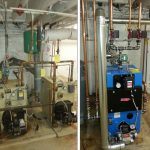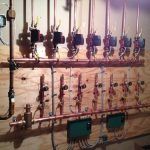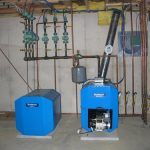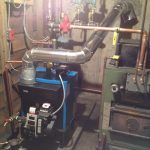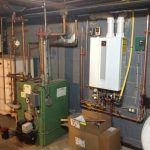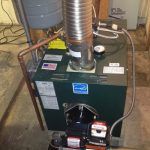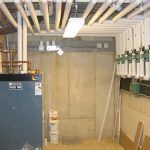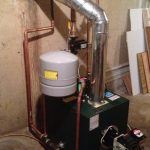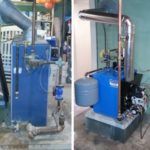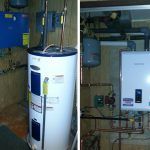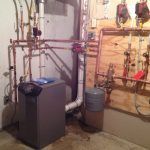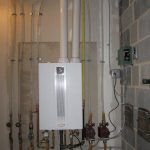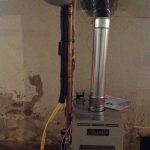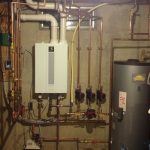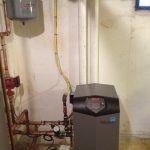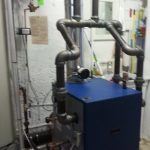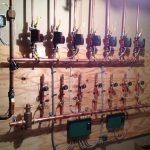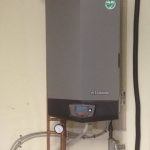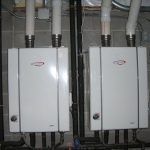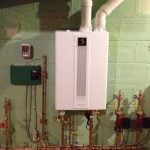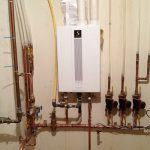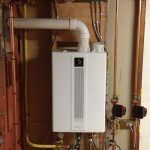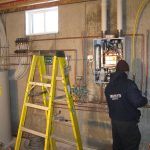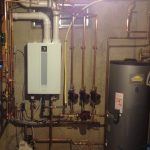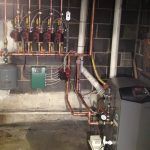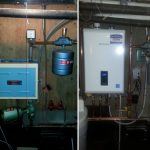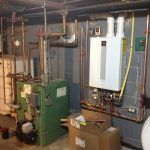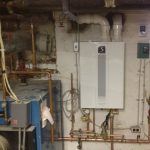Oil Boiler Repair and Installation
Reliability and Efficiency When You Need It
Oil boilers are still widely used in many homes today. Like other types of boilers, oil is an efficient fuel source as it can heat up large amounts of water very quickly. In some newer, more efficient models, you may have the option to use recycled oil or bio-diesel fuels.
- EFM High Efficiency oil fired burner
- EFM oil fired boiler
- Hydronic multi-zone manifold
- New Buderus Oil Boilers
- Oil Boiler Replacement
- Oil Boiler to Gas Conversion
- Oil Fired Boiler
- Old Oil Boiler and Piping
- Residential Oil Boiler Replacement
- Before and after installation of EFM Oil Boiler
- Before and after installation of a EFM High Efficiency Oil Fired Boiler
Oil boilers are a good water heating solution if you do not have the option to connect a natural gas line to your home, or if you have unreliable electric connections as you can still access hot water in a power outage. You will also need plenty of basement space to keep an oil reserve tank.
How It Works
Oil boilers operate very similarly to other boilers. There are a few differences in the oil boilers: the fuel source and circulation of water. In a typical boiler, you have a burner, which in this case, oil fuel is ignited and the heat exchanger transfers heat to the water in the pipes that travels through the home to provide heat in room’s radiators and drinking water. For an oil boiler, a fuel provider is needed to deliver oil into your oil reserve tank—typically located in your basement.
Unlike a gas boiler, you will also need a circulation pump. Although a convection current is present as the water heats up, it does not generate enough speed to circulate the water through the heat exchanger. The pump provides additional circulation. If the pump were to fail, the water would turn to steam, pressurizing the heat exchanger. This could cause pipes to either burst or melt. It is strongly recommended to have a professional clean and maintain your boiler and all of it components for the safety of the equipment.
Benefits of Oil Boilers
- Oil burns evenly and quickly.
- Recycled oil or bio-diesel fuel can be used.
- Some models can be installed outdoors, as well as indoors.
- Hot water is still available during power outages.
- Oil boilers offer an efficient solution in combination with a hot water heater for your domestic water needs.
Other Considerations
- Prices on oil are expensive and change often based on availability and location.
- High demand for oil and its available resource may lead to temporary shortages or outages.
- A chimney or external vent to expel gas is required for installation.
- A storage tank for oil takes up a lot of space in the home.
OIL BOILER PRIORITY SERVICE & MAINTENANCE
Oil boilers should produce little to no emissions, and it can take a trained eye to spot a problem. Receive a complete once-over plus new fuel filter cartridges and burner nozzles. Most other key components, including burner fans and motors, are included with labor free of charge.
Gas Boiler Repair and Installation
Allentown, Lehigh Valley
Quiet, Consistent Comfort: A Perfect Pair with Your Radiant System.
- Navien propane gas efficient combi system
- Burkholder’s HVAC Gas Boiler Lochinvar Primary Piping
- Burkholder’s HVAC Gas Boiler Replacement Installation
- Burkholder’s HVAC Gas Boiler Replacement Installation
- Burkholder’s HVAC Gas Boiler Zoned Installation
- Burkholder’s HVAC Gas Boilers Lochinvar
- Burkholder’s HVAC Gas steam boiler installation
- Burkholder’s HVAC hydronic multi zone manifold
- Burkholder’s HVAC mounted Gas boiler
- Burkholder’s HVAC Quietside Condensing Gas Boiler Installation
- Burkholder’s HVAC Quietside Gas Boiler
- Burkholder’s HVAC Quietside Gas Boiler installation with Pex connection
- Burkholder’s HVAC Quietside Multi-Zone Gas Boiler
- Burkholder’s HVAC Residential Gas Boiler Installation
- Burkholder’s HVAC Residential Gas Boiler Installation
- High efficiency Gas Boiler Installation by Burkholder’s HVAC
- Navien natural gas efficient boiler system
- Oil to Gas Boiler Conversion Installation
- Oil to Gas Boiler Conversion Installation
- Before and after installation of Lochinvar High Efficiency Combi Gas Fired Boiler
In the United States, natural gas is the most common fuel for fired boilers today. It is an easily accessible resource and a cheap heating fuel. Unlike liquid propane or oil fuels, you don’t need to have a truck deliver it to your house—a gas line already runs underneath most homes. Home owners have the very convenient option to heat their house and provide heated water throughout their home with this single appliance.
Using Natural Gas
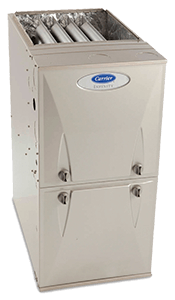 Natural gas, supplied to the home by an underground main line, is fed through a small pipe leading into your home. When the thermostat triggers the boiler to heat the house, a valve opens, releasing the natural gas into a combustion chamber in the form of small jets. An electric spark ignites the fuel. The fire heats the water-filled pipes that circulate through your home. The pipes connect to a radiator where the heated water emits heat energy into the room. Once the heat is exhausted into the air, the cooled water returns through the pipes leading back to the boiler to be reheated and circulated again.
Natural gas, supplied to the home by an underground main line, is fed through a small pipe leading into your home. When the thermostat triggers the boiler to heat the house, a valve opens, releasing the natural gas into a combustion chamber in the form of small jets. An electric spark ignites the fuel. The fire heats the water-filled pipes that circulate through your home. The pipes connect to a radiator where the heated water emits heat energy into the room. Once the heat is exhausted into the air, the cooled water returns through the pipes leading back to the boiler to be reheated and circulated again.
About Condensing Boilers
Boilers have become much more energy efficient over the years. Different models of gas boilers have emerged, but condensing boilers are the most energy efficient today. In a typical gas boiler, there is a return flue at the bottom and another flue at the top. When air in the room cools, it is collected into the return flue to be reheated. In a condensing gas boiler, the return flue is actually connected to a condensing chamber where hot steam and condensation is usually collected and expelled outside of the home. The hot steam can be reused to heat the cooled water and, therefore, allows the boiler to work less to heat the water and air.
Benefits of Gas Boilers
- Natural gas is the cleanest burning fuel, contributing to the safety of our environment.
- Natural gas is an abundant, natural resource and is a very inexpensive source of energy.
- Gas boilers can operate to heat both your home’s water and air in a single machine.
- With natural gas, there is no storage tank or reserve for fuel.
- Efficient models, such as condensing gas boilers, have an AFUE (annual fuel utilization efficiency) rating of 90% or greater.
- Electric ignition of gas eliminates the need for a pilot light for the duration of the boiler’s operation.
- New combustion technologies allows for more efficient heating without using additional fuel.
- Heating of the air and water occurs more quickly than other heating appliances.
Other Considerations to Gas Boilers
- Expensive Initial costs to install a gas boiler, including the hook up for natural gas.
- Natural gas may not be available in your area.
- Requires an experienced, qualified expert to hook up natural gas into your home.
- Fires or explosions caused by a gas leak can cause fatal injuries and extensive damage to the home. Inspections of your gas line and heating equipment is highly recommended in the maintenance of your boiler.
- A separate water storage tank is typically required for potable water.
GAS BOILER SERVICE & MAINTENANCE
Get the most out of your durable gas boiler with professional maintenance that prevents costly breakdowns and energy inefficiencies. Receive an annual tune-up with essential flue cleaning and inspection, and coverage on most repairs and replacement parts.

